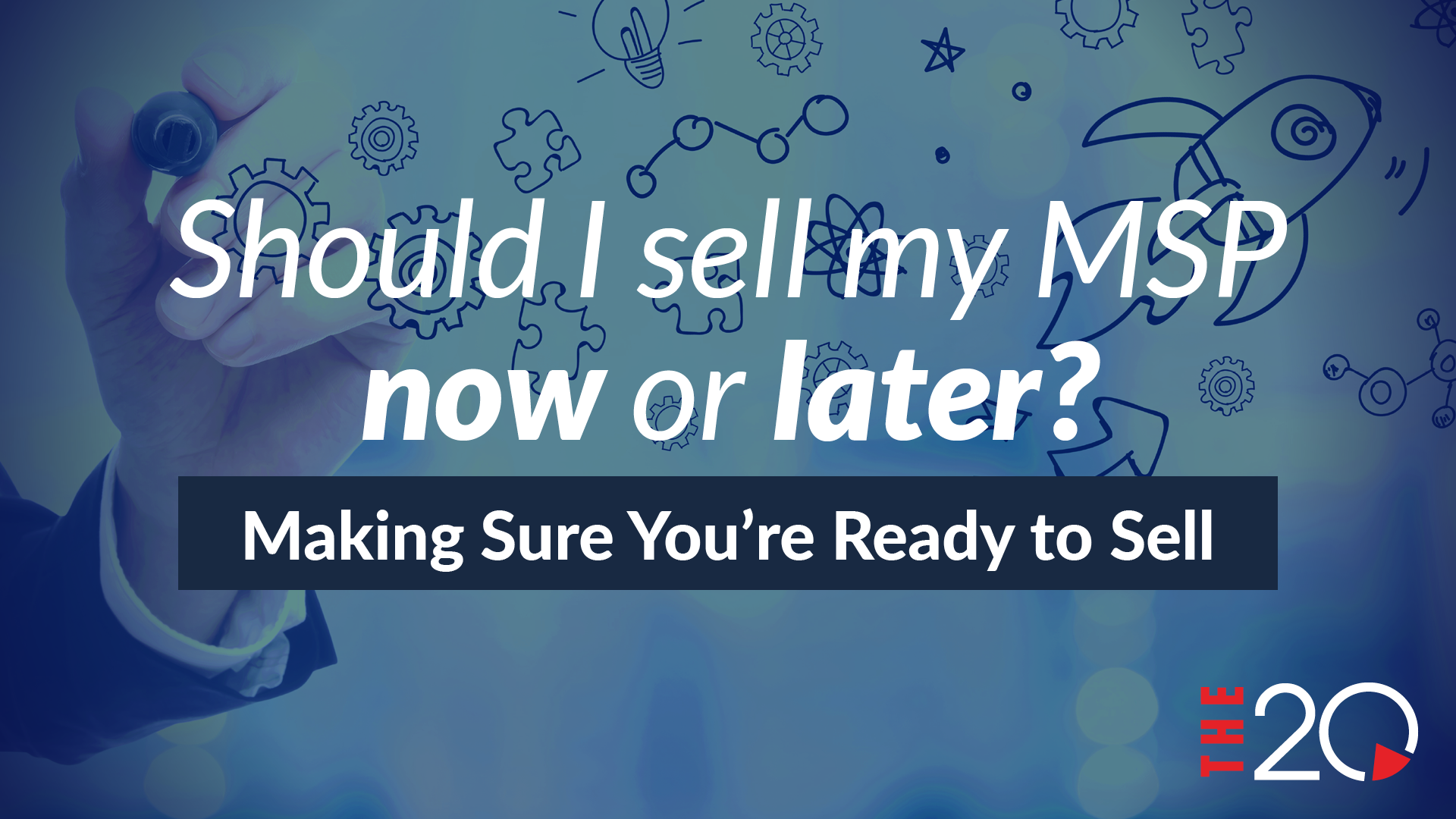Should I Sell My MSP Now or Later?
Making Sure You’re Ready to Sell
In the first installment of this two-part series, we discussed the favorable market conditions that make now a GREAT time to sell your MSP. But market timing is only one piece of the puzzle.
It’s also important to establish whether your MSP business is ready to sell. Is your MSP ‘sellable’?
The short answer is that your MSP is sellable if someone’s willing to buy it. And no, we’re not being glib. It’s all too easy to forget that success in the world of mergers and acquisitions (M&A) boils down to one thing: connecting with the right buyer (or partner, in the case of a merger). Without this crucial piece of the puzzle, everything else is moot.
That said, there are some general factors that strongly influence an MSP’s appeal as an acquisition target. Let’s start with the obvious one: size.
Size Matters
So, what size MSPs are typically sold in today’s M&A landscape?
There’s no simple answer to this question, because different buyers have different requirements – sometimes markedly different.
Some buyers focus on growth and immediate profitability; this type of buyer will be on the lookout for MSPs that bring in serious revenue (at least $2 – 5 million annually), strong EBITDA margins, and a history of consistent expansion.
Other buyers might be more interested in acquiring smaller, less growth-oriented MSPs if they see strategic value, such as access to a new geographic market, unique talent pool, or specific client base.
Bottom line – Even if your MSP falls on the lower end of the revenue spectrum, your unique strengths can help you attract strong offers in the M&A landscape. So, don’t let the fact that you haven’t hit such-and-such a revenue threshold prevent you from even looking into entering the M&A arena.
But whatever your MSP’s size, the following characteristics are sure to impress any potential buyer of your business…
You ≠ Your Business
Your MSP is yours, sure, but that doesn’t mean you and your MSP should be essentially synonymous. You shouldn’t be your business. Wait, what? Let us explain…
A lot of smaller MSPs are more or less dependent on their owners to run smoothly. This can stem from insufficient documentation, or from the owner’s own inability to let go and delegate. Whatever the case, this high level of dependence is something potential buyers don’t want to see – in fact, it’s a huge red flag.
Think about it. If you are your MSP – i.e., if your clients’ loyalty and the integrity of your processes all depend on your direct involvement and presence – there’s a greater chance things will fall apart in your absence. Of course this is going to scare potential buyers!
Bottom line – To get your MSP ready to sell, make sure you have robust documentation and comprehensive processes in place, as doing so will help assure buyers that your MSP will continue to run smoothly under new ownership.
A Relevant Link
Looking for a shortcut to becoming an operationally mature, process-driven company? Consider joining The 20 MSP Group! We take small and mid-sized MSPs and equip them with proven and scalable processes that not only unlock serious growth, but also, impress potential buyers when it comes time to sell your company.
Get in touch to learn more about The 20 and how we help MSPs standardize, scale, and grow like crazy.
Good-Looking Books
Potential buyers will scrutinize your books to evaluate your business’s health and potential, so make sure everything is in order. And we’re not talking in ‘pretty good’ shape either; we’re talking pristine.
Clear, accurate, and up-to-date financial records will not only help you secure a fair valuation, but also build trust with buyers and facilitate a smooth transition. So make sure your books are meticulously organized, as it will help lay the groundwork for a seamless sales process.
Diverse Revenue Streams
This one is straightforward. Buyers not only care about how much revenue your MSP pulls in, but also, where it comes from. More specifically, you don’t want all your revenue – or even most of it – to come from just one or two places.
It all comes down to risk. The more tied your MSP’s income is to just a few clients, the greater risk it poses to any potential buyer of your business. What happens if you lose one of your core clients? Potential buyers don’t want to find out.
For a more detailed, quantitative breakdown of ideal ‘revenue composition,’ download The 20’s free guide to MSP acquisitions: Sell Your MSP the Right Way.
Talented Team
People matter. Your MSP business isn’t just a collection of tools, processes, and revenue streams. It’s also a team of human beings who work together each day to bring your clients exceptional support.
If you’re thinking about selling your MSP, it’s important to keep in mind that your team – what they know and how they work – can be a major draw for interested buyers. Talented technicians are especially valuable in today’s market, where there’s a notable shortage of skilled labor.
Bottom line – If you have a talented technical team with great work ethic and a high level of dedication to client success, it can significantly enhance the value and attractiveness of your MSP to potential buyers.
Summing Up
While there are a number of qualities that make an MSP appealing to buyers, there isn’t a one-size-fits-all ‘profile’ for a sellable MSP.
Different buyers have varying criteria and strategic objectives, so what makes one MSP attractive might not apply to another. Factors such as operational independence, diversified revenue streams, and clean financial records are important, but the unique
strengths and strategic value of your MSP can also play a significant role in its marketability.
At the end of the day, our advice to MSP owners is to err on the side of exploration. Market conditions are so favorable at the moment, with an abundance of hungry buyers on the lookout for quality MSPs to acquire, that it’s worth investigating your options and assessing your MSP’s potential for sale.
Looking for expert feedback on your current exit strategy? Book an hour with Tim Conkle, The 20’s CEO and the visionary behind our unique M&A strategy.


